|
|
|
Sort Order |
|
|
|
Items / Page
|
|
|
|
|
|
|
| Srl | Item |
| 1 |
ID:
081445
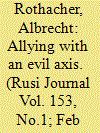

|
|
|
| 2 |
ID:
110330
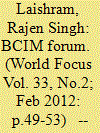

|
|
|
| 3 |
ID:
158731
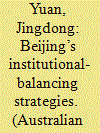

|
|
|
|
|
| Summary/Abstract |
China has in recent years been actively engaged in multilateral diplomacy. From the Shanghai Cooperation Organisation and the Conference on Interaction and Confidence Building Measures in Asia to the Asian Infrastructure Investment Bank and the One Belt, One Road initiative, Beijing is pursuing strategies and promoting norms that are viewed as concerted efforts by China to challenge some of the key institutional arrangements of the existing international order. This article seeks to discuss these contentious issues and assess the rationales, approaches and implications of Chinese diplomacy in initiating and promoting what can be considered as institutional-balancing strategies. The author suggests that the rationales behind these Chinese strategies have as much to do with Beijing’s shifting priorities and the need to address them as with reflecting a degree of dissatisfaction with existing multilateral institutions. And there are more marked differences in Chinese motivations and modalities in security arenas than in economic areas. However, it would be overstating Beijing’s intentions and capabilities if these China-sponsored initiatives are viewed as direct challenges to the existing international and regional orders.
|
|
|
|
|
|
|
|
|
|
|
|
|
|
|
|
| 4 |
ID:
084441
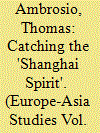

|
|
|
|
|
| Publication |
2008.
|
| Summary/Abstract |
This article examines how the Shanghai Cooperation Organization (SCO) seeks to undermine democratisation in Central Asia. Prior studies of the interplay between international organisations and democracy have tended to examine only one half of this relationship: whether, how, and under what circumstances do international organisations promote democracy? However, the opposite has been largely ignored: how do international organisations sustain autocracy? Authoritarian governments are increasingly adopting policies aimed at preserving their political power and the SCO represents an additional strategy in this regard: utilising multilateral cooperation to defend themselves against regional or global democratic trends. As such, the 'Shanghai Spirit' may be a sign of things to come as autocratic leaders become more bold in their rejection of democratic norms.
|
|
|
|
|
|
|
|
|
|
|
|
|
|
|
|
| 5 |
ID:
095120
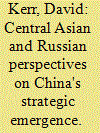

|
|
|
|
|
| Publication |
2010.
|
| Summary/Abstract |
This article employs fieldwork research and literature analysis to examine contemporary perceptions of China's emergence in popular and elite opinion in Russia and the Central Asian states, particularly Kazakhstan. It initially establishes a framework for understanding China's emergence, emphasizing a trilateral dynamic between the hegemonic position of the US in Asia, the evolution of the strategic choices of China's neighbours and the development of strategic regionalism as a mechanism for managing regional spaces. Choosing to take the Commonwealth of Independent States as a particular case of this framework, it argues that the interaction between Russia, China and the US remains highly fluid, particularly under the conditions 'of re-setting' the US-Russian relationship. This means that regional contexts are highly significant; and it establishes Central Asia as an important new strategic region for working out relations between Russia, China, and the US through their interactions with regional states. The second part of the article examines Russian and Central Asian responses to China's emergence. It looks at three categories of motivation in China's regionalism: its system for accumulative growth; its problems with weak constitutionality and transnational security in its western regions; and its concern with US/NATO encroachment on its western frontier and the US attempt to turn Central Asian elites away from their traditional alignments. The third part looks at China's promotion of the Shanghai Cooperation Organisation (SCO) as its mechanism for strategic regionalism in Central Asia. The article questions the SCO's significance in terms of its capacity for governance and functionalism, and points to the problem of institutional competition, notably with Moscow's preferred structure of the Collective Security Treaty Organization. The article concludes that China will be an unconventional superpower that presents different facets of itself in different regional contexts. There will not be a single model of China's emergence and it will continue to develop its international role through a mix of adaptation and experimentation. However, China's strategy will pose a problem for Russia and Central Asia since it seeks to create a strategic space that does not challenge the West, but exists substantially outside the West. Russia, in particular, has to decide whether it will be able to maintain its current stance of independence between Europe and Asia as China's rise shifts the frontiers between East and West.
|
|
|
|
|
|
|
|
|
|
|
|
|
|
|
|
| 6 |
ID:
103028
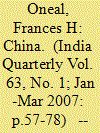

|
|
|
| 7 |
ID:
140841
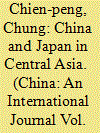

|
|
|
|
|
| Summary/Abstract |
Central Asia is a region where both China and Japan would like to pursue greater roles and interests. Largely initiated by China, the Shanghai Cooperation Organisation has enhanced China’s influence in Central Asia. This has caused concern for Japan, which then sought to expand its presence in the region. Through meetings and dialogues with Central Asian leaders, and by providing aid and loans to states in the region, leaders of China and Japan have been trying to obtain contracts for extracting oil, natural gas, rare metals, uranium and other minerals from Central Asian states, and secure peace in Afghanistan.
|
|
|
|
|
|
|
|
|
|
|
|
|
|
|
|
| 8 |
ID:
112866
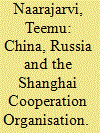

|
|
|
|
|
| Publication |
2012.
|
| Summary/Abstract |
This paper discusses China and Russia and the Shanghai Cooperation Organisation Organisation (SCO), a Eurasian regional organisation established in 2001 and consisting of China, Russia and the four Central Asian republics of Kazakhstan, Kyrgyzstan, Tajikistan and Uzbekistan. I argue that while the two largest members of the SCO are essential to the organisation, they at the same time prevent the SCO from becoming a more comprehensive regional organisation. Moreover, the actions and presence of China and Russia in Central Asia, together with inherently inauspicious characteristics of the region when compared to the post-Cold War new regionalist thinking, hinder the overall regionalisation in the area. However, regionalisation, hopefully in time leading to greater regional cooperation in Central Asia, is very much in the interests of Europe and the European Union (EU) as a potential peaceful way forward in the development of the region.
|
|
|
|
|
|
|
|
|
|
|
|
|
|
|
|
| 9 |
ID:
104909
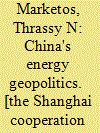

|
|
|
|
|
| Publication |
London, Routledge, 2009.
|
| Description |
x, 167p.
|
| Series |
Routledge contemporary China series; 30
|
| Standard Number |
9780415456906, hbk
|
|
|
|
|
|
|
|
|
|
|
|
Copies: C:1/I:0,R:0,Q:0
Circulation
| Accession# | Call# | Current Location | Status | Policy | Location |
| 056131 | 333.790951/MAR 056131 | Main | On Shelf | General | |
|
|
|
|
| 10 |
ID:
123658
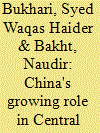

|
|
|
| 11 |
ID:
072976
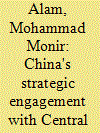

|
|
|
| 12 |
ID:
112793
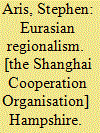

|
|
|
|
|
| Publication |
Hampshire, Palgrave Macmillan, 2011.
|
| Description |
viii, 215p.
|
| Standard Number |
9780230285279
|
|
|
|
|
|
|
|
|
|
|
|
Copies: C:1/I:0,R:0,Q:0
Circulation
| Accession# | Call# | Current Location | Status | Policy | Location |
| 056613 | 341.247/ARI 056613 | Main | On Shelf | General | |
|
|
|
|
| 13 |
ID:
163774
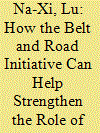

|
|
|
|
|
| Summary/Abstract |
China and Russia issued a joint statement on 8 May 2015 outlining the main approaches to linking the Silk Road Economic Belt (SREB) and the Eurasian Economic Union (EAEU) projects. Both parties believe that to build the ‘Belt and Road’ project, it is necessary to use economic integration laws and actively enhance the role of the Shanghai Cooperation Organisation (SOC) in stimulating regional economic cooperation, promoting construction of the SREB and linkage to and cooperation with the EAEU, creating a Free Trade Area (FTA) in the Asia-Pacific region (APR) and simultaneously begin creating a similar FTA among China, Russia and Central Asia to gradually stimulate interstate trade and promote regional economic development, actively developing—along with an improved model of energy cooperation—infrastructure and related industry and strengthening business contacts and jointly promoting construction of the SREB.
|
|
|
|
|
|
|
|
|
|
|
|
|
|
|
|
| 14 |
ID:
157599
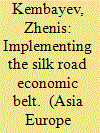

|
|
|
|
|
| Summary/Abstract |
The concept of the Silk Road Economic Belt put forward by the Chinese President Xi Jinping in September 2013 has two major dimensions: “the Road” and “the Belt”. This article examines the background, the legal status, values, institutional framework and major areas of cooperation of the Shanghai Cooperation Organisation (SCO). In doing so, it argues that building “the Road” may lead to the following: (a) the transformation of the SCO from hitherto primarily security-oriented alliance into “the Belt”, i.e. an organisation pursuing also deep economic cooperation, and (b) the establishment of a Silk Road Union based on partnership between SCO and the Eurasian alliance, constituted by two most important regional integration groupings created in the post-Soviet area, the Collective Security Treaty Organization and the Eurasian Economic Union.
|
|
|
|
|
|
|
|
|
|
|
|
|
|
|
|
| 15 |
ID:
166129
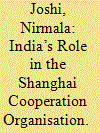

|
|
|
|
|
| Summary/Abstract |
The Shanghai Cooperation Organisation (SCO) comprises four Central Asian Republics (CARs), namely Kazakhastan, Kyrgyzstan, Tajikistan and Uzbekistan; Russia; China; India and; Pakistan. Russia and China are contiguous to Central Asia. India does not have a direct land boundary with the CARs. In Indian strategic thinking CARs are part of its extended neighbourhood. The Russian Federation and the People’s Republic of China have already established a strong presence in the Region and have initiated mega projects. It is an opportunity as well as a challenge for India to carve out a niche for itself in a Region that is of vital importance to it. The article explores the significance of regional grouping as well as India’s ability to play an effective role.
|
|
|
|
|
|
|
|
|
|
|
|
|
|
|
|
| 16 |
ID:
138162
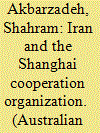

|
|
|
|
|
| Summary/Abstract |
The Islamic Republic of Iran has pursued full membership in the Shanghai Cooperation Organisation (SCO). In doing so, Iran has appeared to be unfazed by the prospect of allying with Russia and China, two countries which have systematically suppressed their Muslim minorities for decades. Similarly, the SCO's Central Asian member states are led by individual leaders who are generally believed to rule in spite of their populations. As a result, Iran's eagerness to join the SCO may appear to contradict its self-promoted image as the champion of Muslim interests, but in reality it sits nicely within its overarching enmity for the USA. Indeed, the SCO is seen as a geopolitical counterweight to the USA. For Iran, this geopolitical opportunity overrides ideological imperatives, with the gap between ideology and geopolitics most evident under the presidency of Mahmoud Ahmadinejad.
|
|
|
|
|
|
|
|
|
|
|
|
|
|
|
|
| 17 |
ID:
179054
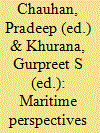

|
|
|
|
|
| Publication |
New Delhi, National Maritime Foundation, 2019.
|
| Description |
233p.pbk
|
| Standard Number |
9788193299869
|
|
|
|
|
|
|
|
|
|
|
|
Copies: C:1/I:0,R:0,Q:0
Circulation
| Accession# | Call# | Current Location | Status | Policy | Location |
| 060018 | 359.03/CHA 060018 | Main | On Shelf | General | |
|
|
|
|
| 18 |
ID:
189724
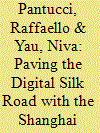

|
|
|
|
|
| Summary/Abstract |
Largely disregarded or derided in the West, the Shanghai Cooperation Organisation (SCO) has grown since its humble beginnings into an important vehicle for Chinese digital and technology penetration in Central Asia. Raffaello Pantucci and Niva Yau show how China has managed to realise some of the economic goals that Beijing has long envisaged for the organisation, even if it has often found itself stymied by other members. In much the same way as the region has been a testbed for Chinese foreign policy approaches, the SCO now appears to have become a key locus for implementation of the Digital Silk Road.
|
|
|
|
|
|
|
|
|
|
|
|
|
|
|
|
| 19 |
ID:
084887
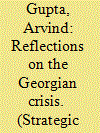

|
|
|
| 20 |
ID:
097315
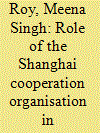

|
|
|
|
|
| Publication |
2010.
|
| Summary/Abstract |
oday, the situation in Afghanistan is mired with the geopolitics of regional and extra-regional players. Bringing stability to the country is a major challenge for the international community. The Shanghai Cooperation Organisation (SCO) has the potential to play an important role, provided it is able to make some adjustments in its policy. Given its strengths and weaknesses, it is likely to focus more on economic, trade and security related issues within the Eurasian region rather than in Afghanistan. However, the geographical proximity of Afghanistan to the SCO member states, particularly, the Central Asian countries, will increasingly demand continued attention of its neighbouring countries to engage Afghanistan bilaterally. Despite the SCO's proposed commitments since 2008 to provide greater attention to the Afghan issue, it may not be able to play any significant role because of its inherent contradictions, economic limitations and greater emphasis on bilateral engagement with Afghanistan by the member countries other than a multilateral engagement. More importantly, Afghanistan's absence from the SCO and the US-NATO military presence in Afghanistan do not provide enough space for the SCO to play any meaningful role in Afghanistan.
|
|
|
|
|
|
|
|
|
|
|
|
|
|
|
|
|
|
|
|
|